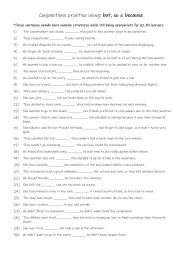
|
A2-B1 Conjunctions practise using: but, so & because
These sentences include more complex structures while still being appropriate for A2-B1 learners. Students read the sentences and complete the gap-fill with the correct conjunction. Answers on page 2.
Level: intermediate
Age: 10-100
Type:
Downloads: 105
|
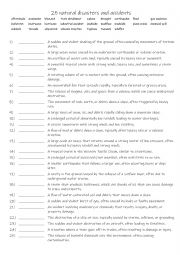
|
B1 25 natural disasters and accidents
Learning vocabulary related to natural disasters and accidents is crucial for understanding the impact of such events on communities, economies, and the environment. These terms enable students to communicate effectively in emergencies, describe events accurately, and engage in global conversations about disaster management and climate resilience. ...
Level: intermediate
Age: 10-100
Type:
Downloads: 124
|
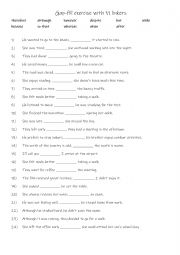
|
B1 11 Linkers practise with 24 sentences
Linkers help clarify the relationships between ideas in both spoken and written communication. For instance, "however" shows a contrast between two ideas, while "because" indicates a reason.In formal writing, especially academic and professional contexts, the proper use of linkers is crucial for articulating complex ideas clearly and persuasively. ...
Level: intermediate
Age: 10-100
Type:
Downloads: 113
|
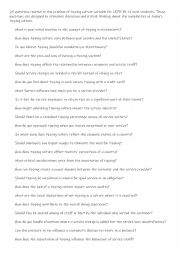
|
Tipping culture for CEFR B1-C1 (1)
25 questions related to the problem of tipping culture suitable for CEFR B1-C1 level students: These questions are designed to stimulate discussion and critical thinking about the complexities of today�s tipping culture.
Level: advanced
Age: 16-100
Type:
Downloads: 102
|
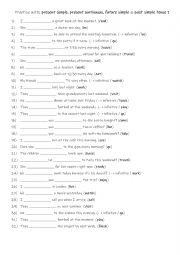
|
A1+-A2 Practise with present simple, present continuous, future simple & past simple tense 1
Students should learn and practice the present simple, present continuous, future simple, and past simple tenses at the A1+-A2 level because these tenses are essential for everyday communication, such as discussing routines, ongoing activities, past events, and simple future plans. They provide a solid foundation for learning more advanced grammar ...
Level: elementary
Age: 8-100
Type:
Downloads: 115
|
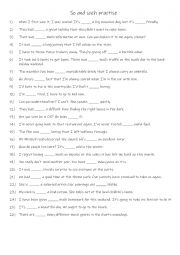
|
A2-B1 Intensifiers: so and such practise
Learning how to use "so" and "such" is important because they help students emphasise their statements and make their speech and writing more precise and expressive.Mastering "so" and "such" instead of relying on words like "very" and "really" adds variety to language, making it more dynamic and interesting. First students familiarise themselves wi...
Level: intermediate
Age: 8-100
Type:
Downloads: 130
|
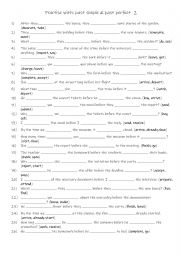
|
A2-B1 Practise with past simple & past perfect 2
First, students need to familiarise themselves with the 2 tenses and their use. Then they read the sentences to see which tense is required to complete the gap-fill using the given infinitive in (). Each tense is used 13 times! Answers on page 2.
Level: intermediate
Age: 9-100
Type:
Downloads: 115
|
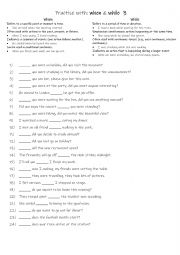
|
A2-B1 Practise with when & while 3
Students should learn when and while as they are essential for describing time relationships and creating complex sentences. By mastering these conjunctions, students can express timing more clearly, improve sentence variety, and communicate ideas more fluently in both writing and speech. First, students need to familiarise themselves with the 2 wo...
Level: elementary
Age: 8-100
Type:
Downloads: 103
|
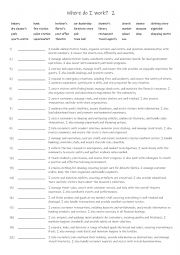
|
A1+-A2 Where do I work 2
First, students need to familiarise themselves with the 30 jobs. Then they read the information about the place to work out which one is needed to complete the gap-fill. Answers on page 2
Level: elementary
Age: 8-100
Type:
Downloads: 127
|
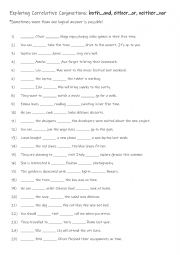
|
A2-B1 Exploring Correlative Conjunctions both...and, either...or, neither...nor 2
Students read the sentences and complete the gap-fill with the correct conjunctions. Answers on page 2.
Level: intermediate
Age: 10-100
Type:
Downloads: 118
|












